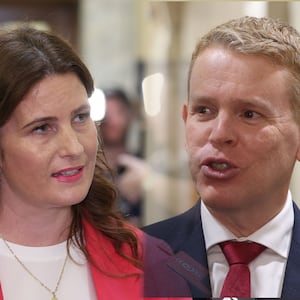Politics
Labour Leader Calls for Government Resignation After GDP Drop

Chris Hipkins, the leader of the Labour Party, has called for the resignation of the entire New Zealand government following a significant decline in the country’s gross domestic product (GDP). The latest data, released on September 27, 2023, revealed that New Zealand’s GDP fell by 0.9% in the June quarter, a decrease that surpassed market expectations.
Analysts had predicted a decline of 0.4%, while forecasts from the Reserve Bank anticipated a 0.3% drop. The extent of the decline has raised concerns about the government’s economic management. Hipkins emphasized that the government must take responsibility for this downturn, suggesting that a loss of public confidence necessitates a complete change in leadership.
While Hipkins has made his position clear, he has not joined calls from former Labour Finance Minister and founder of the Act Party, Sir Roger Douglas, for Nicola Willis, the Economic Growth Minister, to resign. Douglas has been vocal about the need for accountability, specifically targeting Willis as a key figure responsible for the economic situation.
In response to the GDP figures, Willis indicated that she and Prime Minister Christopher Luxon had discussed her role in the government. Luxon has publicly expressed his full confidence in Willis, suggesting that he does not see a reason for her to step down despite the negative economic indicators.
This latest economic data presents a challenging backdrop for the government as it navigates public sentiment around economic performance. The decline in GDP may have significant implications for the government’s policy direction and its standing with voters, particularly as the nation heads into future electoral cycles.
As the political landscape reacts to these developments, Hipkins’ call for a government-wide resignation could signal a shift in the dynamics of New Zealand politics. The Labour leader’s strong stance reflects growing frustration among opposition parties regarding the government’s economic strategy and management.
The implications of this GDP decline are profound, not only for current government officials but also for the broader economic outlook of New Zealand. With the public’s trust in government at stake, the coming weeks may see increased scrutiny of government policies and decisions as well as a potential reshaping of political alliances.
-

 Sports2 weeks ago
Sports2 weeks agoNetball New Zealand Stands Down Dame Noeline Taurua for Series
-

 Entertainment2 weeks ago
Entertainment2 weeks agoTributes Pour In for Lachlan Rofe, Reality Star, Dead at 47
-

 Entertainment4 weeks ago
Entertainment4 weeks agoKhloe Kardashian Embraces Innovative Stem Cell Therapy in Mexico
-

 Sports1 month ago
Sports1 month agoGaël Monfils Set to Defend ASB Classic Title in January 2026
-

 Sports2 weeks ago
Sports2 weeks agoSilver Ferns Legend Laura Langman Criticizes Team’s Attitude
-

 World2 months ago
World2 months agoPolice Arrest Multiple Individuals During Funeral for Zain Taikato-Fox
-

 Sports4 weeks ago
Sports4 weeks agoTragic Death of Shane Christie Sparks Calls for Player Safety
-

 Entertainment3 weeks ago
Entertainment3 weeks agoSydney Sweeney Launches Jimmy Choo Campaign Amid Controversy
-

 Health6 days ago
Health6 days agoBella Hadid Hospitalized in Ongoing Battle Against Lyme Disease
-

 Health3 weeks ago
Health3 weeks agoDuchess of Kent Passes Away at 92, Leaving Legacy of Service
-

 Top Stories2 months ago
Top Stories2 months agoFormer Superman Star Dean Cain Joins U.S. Immigration Agency
-

 Sports2 months ago
Sports2 months agoRichie Mo’unga’s All Blacks Return Faces Eligibility Hurdles




















